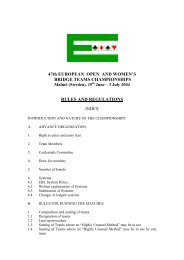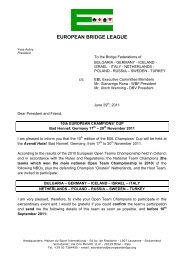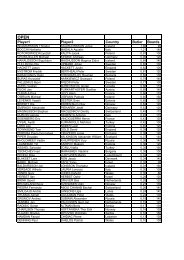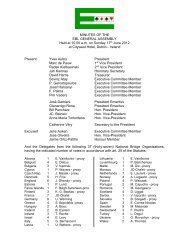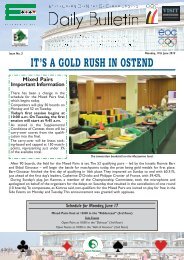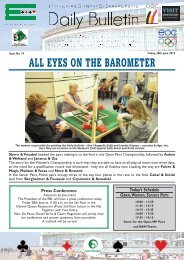1 - European Bridge League
1 - European Bridge League
1 - European Bridge League
You also want an ePaper? Increase the reach of your titles
YUMPU automatically turns print PDFs into web optimized ePapers that Google loves.
9 th <strong>European</strong> Youth <strong>Bridge</strong> Pairs Championship Daily Bulletin, No 1, 08.07.17<br />
A PLAYER’S QUICK GUIDE TO THE<br />
NEW LAWS OF BRIDGE (2007)<br />
By Eitan Levy — Chief TD<br />
This tournament is being played under the new Laws of<br />
Duplicate <strong>Bridge</strong> 2007. Some of the changes which<br />
directly affect players are outlined below. These are not<br />
necessarily the biggest changes or the most important,<br />
but they are the ones that will have the biggest impact<br />
on the player at the table.<br />
As before it is important to call the TD when there has<br />
been an irregularity and not to try to solve the<br />
irregularity by yourself. Failure to call the TD will often<br />
result in the loss of certain rights. And don’t try to<br />
explain why the irregularity happened — you could be<br />
passing unauthorized information to your partner. Wait<br />
for the TD to ask the relevant questions.<br />
Drawing attention to an irregularity: Any player,<br />
including dummy, may attempt to prevent another<br />
player committing an irregularity (that is before it<br />
happens), and any player may draw attention to an<br />
irregularity during the bidding. During the play, any<br />
player, except dummy, may draw attention to an<br />
irregularity (dummy may do so only after the play of the<br />
hand is concluded.)<br />
Looking at system cards: After the bidding but<br />
before the opening lead is faced, both declarer and<br />
dummy (but NOT defenders) may look at their<br />
convention card, and inform the TD and opponents<br />
about a mistaken explanation.<br />
2<br />
Insufficient bids: Here there has been significant<br />
change, and, unlike the previous law, in certain<br />
circumstances artificial bids do not automatically silence<br />
partner from bidding. It is important to note, that if you<br />
make an insufficient bid, not to attempt to explain the<br />
bid or why you made the insufficient bid (“oops, I didn’t<br />
see the overcall”) unless specifically asked by the TD.<br />
Dummy spreads his hand in columns as before, but<br />
now it is now obligatory that the lowest ranked cards<br />
are towards declarer.<br />
“No hearts, Partner?”: Declarer may ask a defender<br />
if he has a card of the suit led, and dummy may ask<br />
declarer but not a defender. The big change is that now<br />
defenders are allowed to ask declarer and also each<br />
other.<br />
The automatic two trick transfer for an established<br />
revoke only applies when the revoker has won the<br />
revoke trick. Only one trick is transferred for other<br />
revokes subject to rectification. All this provided that<br />
the revoker has won trick/s after the revoke. The TD<br />
will still transfer more than the automatic transfer if the<br />
revoker has gained more by his revoke.<br />
“That was our trick!”: A defender or dummy may<br />
draw attention to an incorrectly pointed trick, but only<br />
until the first card of the next trick is played. However,<br />
declarer may also draw attention to previous tricks<br />
incorrectly pointed.



